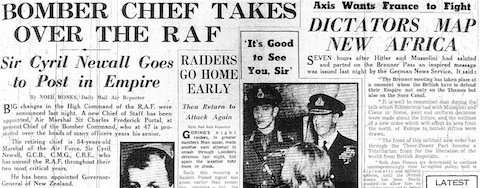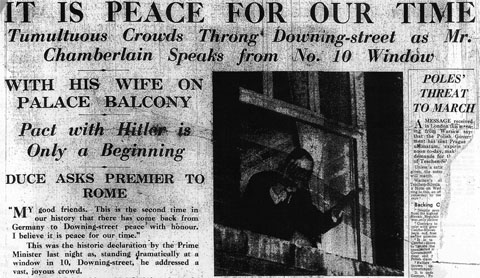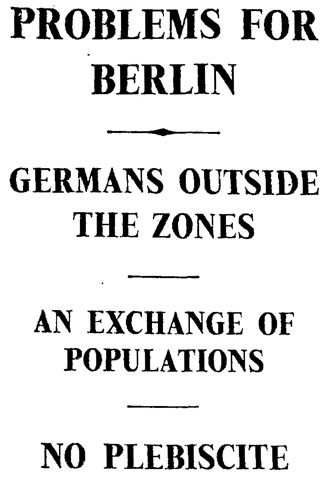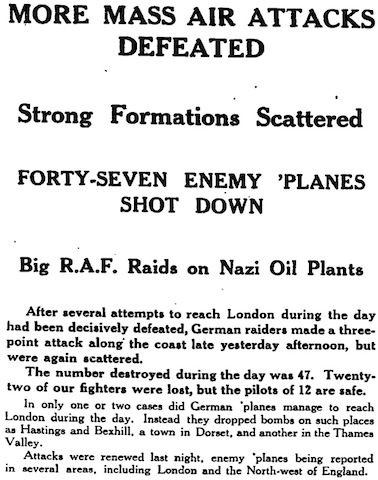
The Daily Mail today leads with changes at the top of the RAF. The Chief of the Air Staff, Marshal of the Royal Air Force Sir Cyril Newall, has been kicked upstairs to the Governor-Generalship of New Zealand. His replacement, Air Marshal Sir Charles Portal, has come from commanding Bomber Command; and his replacement there will be Air Marshal Sir Richard Peirse. Noel Monks emphasises the relative youth — 47 and 48 respectively — and experience of both Portal and Peirse, and is confident that they are the right men for the job (1):
Both men are great believers in offensive operations. Both strongly maintain that the winning of the war will be greatly assisted by large-scale bombing offensives against the Nazis in their own territory
Newall’s retirement should not be seen as a disgrace, as it comes ‘at the moment when the R.A.F. are universally acclaimed the saviours of Britain’.
Similar sentiments — at least insofar as Britain being saved — pop up in a number of places today, albeit in a different context. The leading article declares that ‘HITLER is losing the Battle of Britain, if he has not already lost it’ (2), thus explaining his meeting with Mussolini at the Brenner Pass, in order to come up with a new plan. The Manchester Guardian makes the same argument in an article entitled ‘Axis’s failure against Britain’: ‘Germany has been defeated in the first part of the Battle for Britain’ (7). The aeronautical correspondent for The Times notes a change in the German and Italian press (2):
They no longer speak of London as a “doomed city,” and Gayda, Mussolini’s “mouthpiece,” recently warned the Italian people that they could not expect the war to be won quickly. A few weeks ago he was describing the air raids on London as the “culminating phase” of the war.
In fact, there has been a ‘break in the night raids’:
The night raids on London seem to becoming progressively less effective, although random bombing in the suburbs continues to render people homeless and cause casualties among the civilian population. German bombers can no longer wander at their leisure and attack the areas which they want most to bomb, and during the past week the number of aircraft penetrating to Central London has become smaller and smaller.
He attributes this to the increasingly accurate anti-aircraft barrage, in turn due in part to ‘the new predictor’. But ‘Other writers’ suspect it’s due to ‘the operation of mysterious new defence inventions’. They’re probably thinking along the same lines as some of the Daily Mail‘s readers. On page 2 Monks prints some of their ‘ideas to beat the night bomber’. Edward E. Pacey of Booton says,
Surely our electrical engineers can find a means of affecting the compasses of the Nazi raiders by current via the balloon barrage?
From Wallasey, Sidney Underhill writes to ask:
Would it not be possible to intercept the night bombers by firing smoke shells at them, this smoke screen to contain a highly inflammable mixture which would be set on fire by the engine exhaust of the raiders?
A. Bennett of Liverpool suggests ‘a barrage of sky-mines’:
These mines could be flown from the roofs of big buildings, making a real minefield of our cities.
There are also suggestions for flying searchlights, magnetic balloon barrages and what seems to be some sort of grappling hook deployed by anti-aircraft shell. Monks says that ‘Comment by the authorities […] is withheld in the interests of national security’ — possibly because the Luftwaffe could use the sound of their laughter to zero in on their location.
The Times‘s first leading article today discusses ‘The mood of Britain’. It declares that (5):
The Nazi tactics of indiscriminate bombing for purposes of mass terrorization have established beyond all doubt that this is, in the current phrase, a people’s war. The instruments of destruction have been loosed upon the whole population of London; and, by accident or design, the poorest have borne the brunt of the attack. The psychological reaction has taken many forms. Dogged endurance of hitherto unheard-of hardships, burning indignation at Nazi inhumanity, and a generous spice of Cockney humour have all played their part in forging that iron wall of civilian determination which, side by side with the skill and heroism of our pilots, has excited the admiration of the whole world. We know now the meaning of total war and we know that we, as a people, can face it without flinching.
But what does this story from the Daily Mail indicate, if not flinching?
SAFETY-SEEKERS CROWD OUT THE CHILDREN
£4 a Week for a Room
By Daily Mail reporterSAFETY-SEEKERS, ready to pay almost any price for a room, are preventing thousands of London children from finding refuge amid the mountains and valleys of the Lake District. Local authorities, particularly in Kendal, may have to use their powers of compulsion to find the children homes.
Does this sound like a ‘people’s war’?
[G. E. Spencer, a Kendal building officer said] “But the real scandal is that parts of the Lake District are so flooded with private evacuees that poor children from London cannot find refuge.”
“We are scheduled to take thousands of London children, but the arrival of a few hundreds would mean chaos.”
The ‘people’s war’ still seems more like an ideal than a reality. In that spirit The Times‘s call to ‘rebuild a better Britain’ is welcome: ‘Out of this horror must come the building of a better housed as well as a better fed British people’.
![]() This work is licensed under a Creative Commons Attribution-NonCommercial-NoDerivatives 4.0 International License.
Permissions beyond the scope of this license may be available at http://airminded.org/copyright/.
This work is licensed under a Creative Commons Attribution-NonCommercial-NoDerivatives 4.0 International License.
Permissions beyond the scope of this license may be available at http://airminded.org/copyright/.




Pingback: Airminded · Monday, 7 October 1940